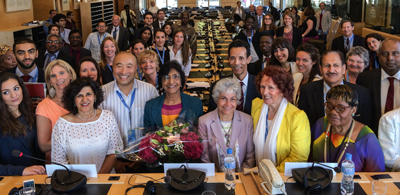It was the last meeting of UN High Commissioner for Human Rights, Navi Pillay, with civil society actors that engage with human rights bodies in Geneva.
Pillay, whose tenure as the highest UN authority on human rights concludes at the end of August, wanted to exchange one last time with the NGO community in Geneva on various human rights issues and country situations, in particular the space reserved for civil society and human rights defenders.
“When I was appointed High Commissioner for Human Rights, I was in no doubt that civil society would continue to occupy a special place in my work. As a human rights defender myself, it was obvious to me that the views and advice of civil society would be indispensable,” she said.
Pillay highlighted the vital role that NGOs play in raising the attention of her Office on human rights trends and country situations, as well as giving an arena to human rights defenders from across the globe to voice their concerns at the Human Rights Council and other platforms.
The High Commissioner also stressed that human rights defenders should be able to express their views at the UN, free from fear of reprisals.
“I find it abhorrent – as you do – that defenders coming to Geneva as part of their human rights work should be exposed to intimidation, threats and harassment by their Governments, whether here, or on their return home,” she said.
Pillay focused much of her tenure on promoting the rights of women, in keeping with her career as a renowned international jurist and activist for women’s rights.
She encouraged her interlocutors to continue to draw attention to gender-based violence; women’s participation in decision making; and smear campaigns and sexual harassment against women human rights defenders.
“Your efforts on their behalf help to break through the isolation that many women experience, whether because of Governments’ attempts to silence them, or because of their communities’ reactions to their efforts to seek more rights, and more meaningful participation in governance and policy decisions that affect their lives,” she said.
“OHCHR’s thematic priority on ‘Widening the Democratic Space’ provides a framework for our office as a whole – in HQ and in the field – to provide more support to civil society, and to raise the profile of our work together over the next four years,” she added.
The Deputy High Commissioner, Flavia Pansieri, echoing Pillay’s remark, said that going forward with the Widening the Democratic Space strategy, the UN Human Rights Office will continue to value engagement with human rights defenders to orient the work of the Office.
Many of the 80 NGO representatives present at the meeting wanted to pay tribute to Navi Pillay, and also took the opportunity to raise a number of country situations, and a wide range of human rights concerns.
Budi Tjahjono, speaking on behalf of the Human Rights Committee of the Conference of NGOs with Consultative Relationship with the UN/Franciscans International expressed the organizations’ gratitude for the High Commissioner’s dedication to defend the efforts of civil society actors.
“The civil society space and democratic space are not something to be taken for granted, we have to defend it, and you work along with us to protect this space,” he said.
Renate Bloem, representing the World Alliance for Citizen Participation (CIVICUS), recalled Navi Pillay’s achievements with the Durban Review Conference; in strengthening of the human rights treaty body system; and in being “the unwavering advocate for defending the space for civil society and human rights defenders.”
“You gave human rights a different ranking, a larger importance in the world. You were the voice of the voiceless, of those who could never make it to the centres of power or to the Human Rights Council. But you spoke truth to power without fear and you are now the champion of human rights, our champion,” Bloem said. “You were also our reference point and benchmark we could trust for veracity. If you had said something, we could believe it to be true.”
OHCHR
